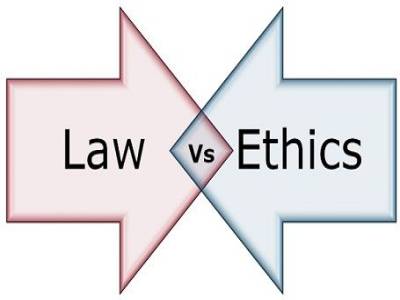Similarities And Differences Between Law And Ethics

People's behaviors are generally governed by law and ethics everywhere in the world. Law and ethics are closely related concepts since their ultimate goal is to stop immoral or criminal behavior in society. Many have positioned law and ethics next to each other because of these similarities. There is, nevertheless, a distinction between ethics and law. This article goes into great detail on the distinctions between the two terms.
Definition Of Law
A law is an official decree that is implemented in a state to settle conflicts and control social interactions, behavior, and commerce. The term law can also refer to the system or set of rules and regulations that define the state's DOs and DON'Ts, control member behavior, and impose penalties and consequences on those who violate them.
In summary, laws are a system of rules and regulations that are implemented by government officials in a state to regulate citizen behavior and acts. Violators of these laws may also face penalties or other sanctions.
Definition Of Ethics
Ethics are the moral precepts that direct, regulate, or impact a person's behavior. It can also mean the set of rules that specify what a person should and shouldn't do.
Definition of ethics are essentially deals with what is right or wrong, good or terrible, and what is best for each person as well as for society as a whole.
READ ALSO » Seven (7) Differences Between Religion And Morality
For ethics, Like in the automobile, I'm driving carefully out of respect for other people's feelings and to avoid damaging their vehicle, I am driving cautiously. Though, in accordance with the law, so as not to go above the speed limit and incur the severe penalty for violations.
People must abide by the law, as previously explained, yet they are free to follow ethical standards. Though law is harsh, particularly in its sanctions and punishments, ethics are kind moral guidelines.
Similarities Between Law and Ethics
1. They are both tools for maintaining social order.
2. They both care about keeping society free from immoral and illegal behavior.
3. They both seek to improve society and make it better.
4. They both govern people's behavior and conduct within society.
5. Law and ethics establish standards of conduct for professional associations like social workers, physicians, attorneys, and so on.
READ ALSO » Top 8 Differences Between Tribunal And Court
6. To provide a moral standard for everyone in the community, ethics and law collaborate closely.
7. They both act as middlemen in our dealings and interpersonal relationships.
Differences Between Law And Ethics
It's possible that the words' definitions in this article did not adequately highlight their distinctions from one another. Therefore, it is essential that we investigate these variations. They consist of:
1. A system of laws and regulations known as law directs and governs how people behave in society. On the other hand, moral principles known as ethics control how people behave in society.
2. Ethics is adaptable and subjective, whereas law is firm and objective.
3. Although everyone's behavior in society is governed by both law and ethics, law punishes those who break its provisions, whereas ethics only establishes moral, religious, and social guidelines without imposing any other penalties.
4. While ethics does not call for any enforcement by enforcement agencies, law does. Enforcement must be carried out by regulatory bodies and enforcement organizations.
5. While ethics has no legal weight at all, law has legal implications for a nation or state, as well as its citizens.
READ ALSO » Clear Differences Between Citation And Reference
6. Written laws are common, while written ethics are less common.
7. The law is burdensome. That is to say, it is exclusive to a State or nation and only applies there. Ethics, however, are universal. It is therefore relevant at any time and anywhere.
8. While ethics is rarely published, law is.
9. Ethics regulates personal and certain professional behavior, while law controls society as a whole.
10. Moral judgments inform ethical decisions, but legal judgments are based on the codification of certain ethical principles, transgressing which may carry consequences.
In conclusion, the Legislature, attorneys, and other administrative bodies are the ones who created laws. Philosophers, religious authorities, and community elders, on the other hand, develop ethics.
I hope that this post has made clear the subtle distinctions between ethics and law, and that you now recognize these distinctions. Keep checking back to our blog for more fascinating and educational content.
